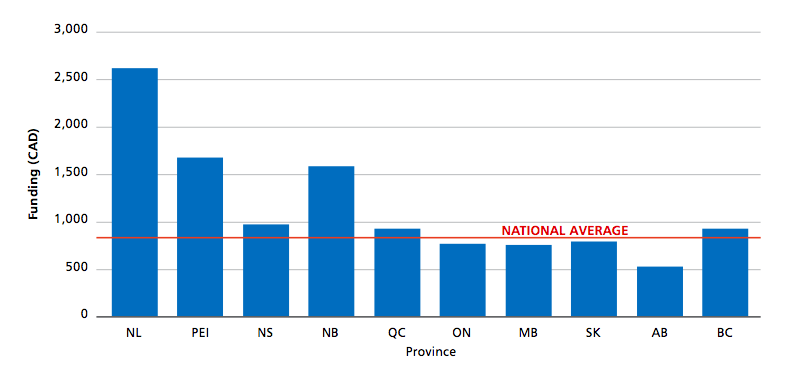
The Canada Summer Jobs Program is the federal government’s primary initiative for subsidizing work for the student-age population during off months at educational institutions. Recently, the program has come under scrutiny for Ottawa’s decision to impose a values test on recipient organizations, bringing the program unprecedented public attention.
This paper reviews the national jobs program through a different lens: regional equity. Even though the program is set up as a “people prosperity” initiative instead of a “place prosperity” initiative, there are significant disparities among regions and provinces when it comes to federal job subsidies.
Funding Per Student Unemployed, 2016-18 Average

A review of program outcomes and Statistics Canada data shows that all four Atlantic Provinces received more money, per unemployed student, than the national average – and significantly more than the Prairie Provinces and Ontario for an average of the 2016 to 2018 years. New Brunswick and Prince Edward Island received about twice as much as the national average, while Newfoundland and Labrador received more than three times the national average over this period.
The current federal government ramped up the program when it took office in 2015. Yet during the studied period, average unemployment rates in the Maritime provinces declined while those rates worsened in Western Canada.
In light of the evidence of these disparities, this paper argues that the federal government needs to recalibrate the Canada Summer Jobs Program to include the consideration of regional equity in subsidies. It offers three reasons for this change:
Local Economic Circumstance and Student Employment
First, there does not appear to be a relationship between local economic circumstances, or student unemployment, and subsidies. Since horizontal equity demands that individuals be treated equally regardless of their province of origin, it makes sense to distribute funds without discrimination of this kind.
Politicized Decision Making
Second, politicians are substantially involved in the decision of to whom and how much money is allocated under the program. Given this politicized aspect to administration, there is no compelling reason for disparate funding between regions, especially in light of disparities in other programs under the federal government, such as equalization and employment insurance (EI) benefits.
Atlantic Canada in Collaboration with Ontario and Western Canada
Third, the paper argues that in a climate of regional strain on the federation, Atlantic Canada and the Maritimes in particular need to work collaboratively with Ontario and Western Canada on ensuring fiscal transfers are fair. Ending disparities in summer job funding, which aren’t supported by sound public policy principles, would introduce regional equity and show the rest of the country that Atlantic Canada is willing to co-operate on transfer reform where it is supported by evidence.
Read the study here
READ THE PRESS RELEASE: “Rethinking Summer Job Subsidies”

David Murrell

Alan Chan

View additional data on the Canada Summer Jobs Program, riding by riding in Atlantic Canada.

